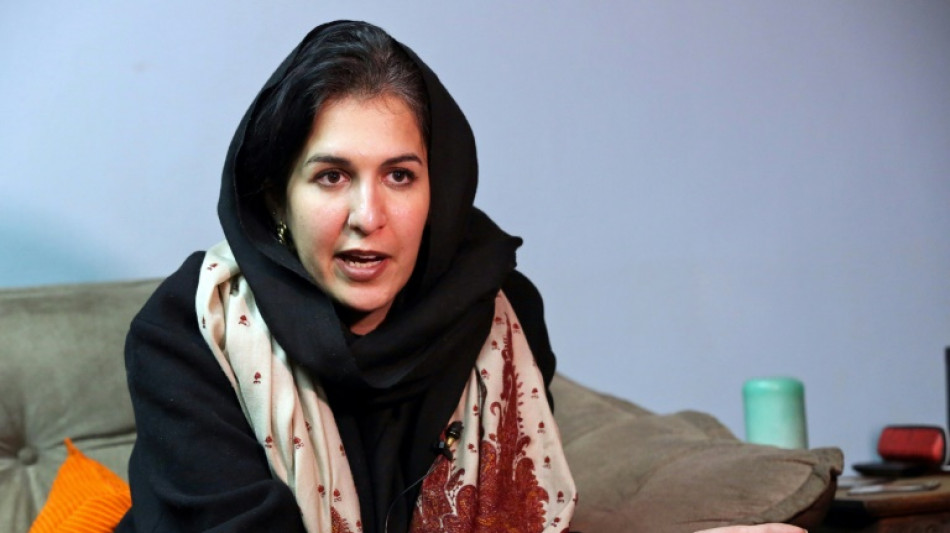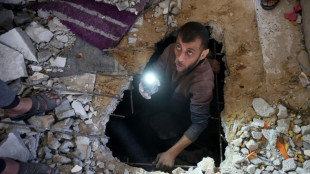
-
 Hamas says open to 5-year Gaza truce, one-time hostages release
Hamas says open to 5-year Gaza truce, one-time hostages release
-
Iran, US hold new round of high-stakes nuclear talks

-
 Up at dawn for front-row seat to history at Francis's funeral
Up at dawn for front-row seat to history at Francis's funeral
-
Pakistan ready to 'defend sovereignty' after India threats

-
 Huge crowds flock to Vatican for Pope Francis's funeral
Huge crowds flock to Vatican for Pope Francis's funeral
-
Xi says China must 'overcome' AI chip challenges

-
 Indian army says new exchange of gunfire with Pakistan
Indian army says new exchange of gunfire with Pakistan
-
Epstein accuser Virginia Giuffre takes own life in Australia: family

-
 Hundreds of buildings damaged, dozens injured in 6.3 Ecuador quake
Hundreds of buildings damaged, dozens injured in 6.3 Ecuador quake
-
India and Pakistan's Kashmir fallout hits economy too

-
 Francis's funeral to be grand farewell to 'pope of the poor'
Francis's funeral to be grand farewell to 'pope of the poor'
-
Pogacar faces defiant Evenepoel at Liege-Bastogne-Liege

-
 Chelsea eye great escape against Barcelona in Women's Champions League
Chelsea eye great escape against Barcelona in Women's Champions League
-
Iran, US to hold new round of high-level nuclear talks

-
 'Energy and effort' pay off for Reds as Blues' woes continue
'Energy and effort' pay off for Reds as Blues' woes continue
-
Albatross and closing birdie lift China's Liu to LPGA Chevron lead

-
 On the horizon? Wave of momentum for high seas treaty
On the horizon? Wave of momentum for high seas treaty
-
Top Mistakes to Avoid When Building Credit History

-
 Developing countries should fast-track US trade deals: World Bank president
Developing countries should fast-track US trade deals: World Bank president
-
Grizzlies' Morant 'doubtful' for must-win game 4 v Thunder

-
 Trump in Rome for pope funeral in first foreign trip of new term
Trump in Rome for pope funeral in first foreign trip of new term
-
Trump says Russia-Ukraine deal 'very close' after new Kremlin talks

-
 US rookies lead PGA pairs event with McIlroy and Lowry in hunt
US rookies lead PGA pairs event with McIlroy and Lowry in hunt
-
Trump tariff promises get a reality check

-
 Warriors coach Kerr 'relatively optimistic' injured Butler will play game 3
Warriors coach Kerr 'relatively optimistic' injured Butler will play game 3
-
Postecoglou hopes 'Stonecutter's Credo' can inspire Spurs

-
 PSG lose unbeaten Ligue 1 record ahead of Arsenal showdown
PSG lose unbeaten Ligue 1 record ahead of Arsenal showdown
-
Venezuela accuses El Salvador president of 'human trafficking'

-
 Own goal takes Sundowns to African final against Pyramids
Own goal takes Sundowns to African final against Pyramids
-
Scores of buildings damaged, 20 injured in Ecuador quake

-
 US stocks extend rally as market eyes busy calendar next week
US stocks extend rally as market eyes busy calendar next week
-
Pope's death triggers surge of disinformation he fought against

-
 Rovanpera takes control of Rally Islas Canarias
Rovanpera takes control of Rally Islas Canarias
-
Zelensky insists Crimea is Ukrainian as US envoy meets Putin

-
 Patel and Mendis help Sunrisers beat Kings in Dhoni's 400th T20
Patel and Mendis help Sunrisers beat Kings in Dhoni's 400th T20
-
Copa del Rey ref statements 'unacceptable': Real Madrid after boycotting final build-up

-
 Insurance CEO's accused killer pleads not guilty to federal murder charges
Insurance CEO's accused killer pleads not guilty to federal murder charges
-
FBI arrests Wisconsin judge for shielding undocumented migrant

-
 Brazil ex-president Collor de Mello jailed for corruption
Brazil ex-president Collor de Mello jailed for corruption
-
Zelensky insists Crimea 'belongs' to Ukraine as US envoy meets Putin

-
 Real Madrid boycott Copa del Rey build-up over referee complaints
Real Madrid boycott Copa del Rey build-up over referee complaints
-
Trinidad and Tobago votes for parliament, PM, with opposition in lead

-
 IMF chief hails 'constructive' Spring Meetings held under tariff uncertainty
IMF chief hails 'constructive' Spring Meetings held under tariff uncertainty
-
Iran FM Araghchi in Oman ahead of nuclear talks with US

-
 Dozens of buildings destroyed, 20 injured in Ecuador quake
Dozens of buildings destroyed, 20 injured in Ecuador quake
-
Young Barca must 'enjoy' Real Madrid Copa final fight: Flick

-
 Pakistan and India border closure separates families
Pakistan and India border closure separates families
-
Brazil's Bolsonaro 'stable' after post-surgery setback

-
 Catholics in secular Cuba hail Francis as 'bridge'
Catholics in secular Cuba hail Francis as 'bridge'
-
US envoy Witkoff, Putin discuss 'possibility' of direct Russia-Ukraine talks


Obey or leave: NGOs torn over Taliban ban on women staff
Aid groups say they have been "pushed against a wall" by the Taliban prohibiting Afghan women from working for NGOs, a ban that has left a dangerous gap in life-saving support.
Afghanistan's NGOs have been instrumental in trying to address one of the world's worst humanitarian crises, with half the country's population hungry and three million children at risk of malnutrition.
"It is impossible for us to continue our activities in the country if we don't have women as part of our organisations at all levels," Samira Sayed-Rahman, a senior official at International Rescue Committee (IRC), told AFP.
Some 1,260 NGOs operate across Afghanistan, with thousands of women workers providing services in healthcare, education, water and sanitation.
The IRC is one of several NGOs -- along with CARE and Save the Children -- that have suspended operations while they urge the Taliban to revoke the ban.
The discriminatory Taliban policy will see thousands of women lose their jobs and many more cut out of aid loops, workers say.
"The Taliban have pushed us against a wall," said a senior official at a foreign NGO, who asked not to be identified.
"They tell us, 'If you choose to leave instead of obeying our rules, then the (humanitarian) situation will only worsen'."
The ban was one of two crushing orders released in rapid succession last month: just days earlier, Taliban authorities banned women from university education.
It was the culmination of a slew of drip-fed restrictions on women's lives.
- Women-to-women aid -
In deeply conservative and patriarchal Afghan society, it is widely considered inappropriate for a woman to speak to a man who is not a close relative.
Women are therefore vital for on-the-ground aid operations, particularly in identifying other women in need, said Reshma Azmi, deputy country head for CARE in Afghanistan.
"A female beneficiary also feels more comfortable talking to a female aid worker... that's why it's not possible without women staff," Azmi told AFP.
CARE provided aid to about half a million women and children in 2022, including offering classes for girls run by women teachers.
"Without our female staff, we would not have reached even half of them," Azmi said.
Government officials claim the ban was imposed because women were not observing Taliban rules on wearing the hijab, or being accompanied by a male relative while travelling.
But several aid workers that AFP spoke to said they had not received any warning of violating cultural norms.
"Humanitarian organisations respect the values, traditions and culture of Afghanistan," Samy Guessabi, head of Action Against Hunger in Afghanistan, told AFP.
Aid workers and analysts say the excuse is a cover, with the Taliban's supreme leader and his inner circle relentlessly squeezing women out of public life.
"There is a very conservative group within the regime that does not want women to be seen in public -- even if these women are involved in community service," another aid official said.
The Taliban insist aid can still reach the needy by being delivered to the men in the family, reducing the need for women aid workers.
The ban excludes the United Nations, which has condemned the order and joined NGOs in holding meetings with the Kabul authorities demanding an explanation.
However, UN Resident Coordinator in Afghanistan Ramiz Alakbarov said they would not halt aid in protest because it was "important to stay and deliver".
"The best way of coming to a solution is not pressure. It is a dialogue," he said last week.
- Brink of famine -
Several NGOs had permission to work in areas controlled by the Taliban during two decades of fighting between the US-backed government and the Islamist movement's insurgents.
"There used to be discussions and negotiations with local Taliban commanders -- and even then we had lots of female staff working on our projects," said an aid official.
"The objective was made clear, that we are neutral... and our aim is to reach out to people in need, and nothing else."
Frustration has also grown in the NGO community because the ban came when aid workers had only just penetrated areas previously inaccessible during the war.
"There are many parts that have received aid for the first time ever, and women employees have been an integral part of that response," IRC's Sayed-Rahman said.
Afghanistan, which was almost entirely dependent on aid, has seen its economy teeter on the brink of collapse since the Taliban takeover in August 2021, when Washington froze billions of dollars of Afghan assets.
"Last winter, it was humanitarian aid that prevented a famine," said Sayed-Rahman.
"If we are not able to deliver aid in the same way, we are going to be faced with a very horrific situation across the country."
P.Santos--AMWN